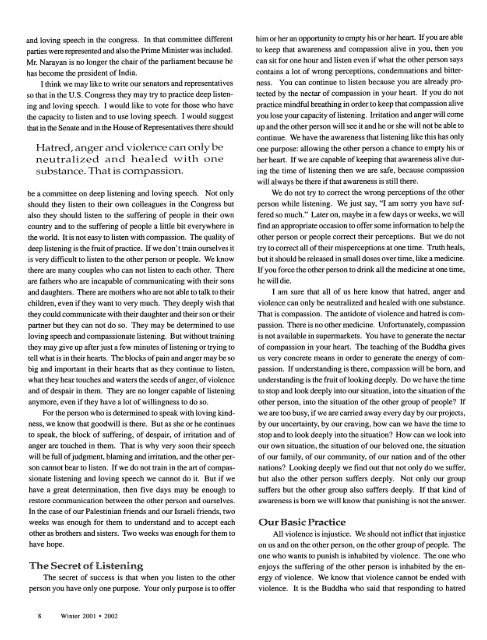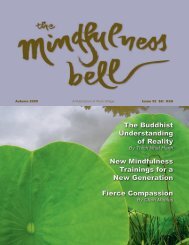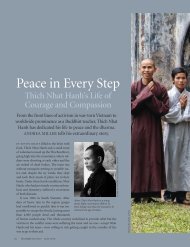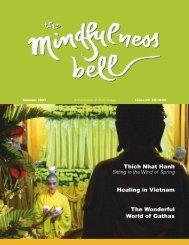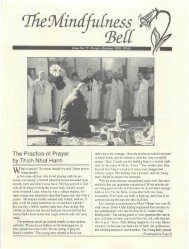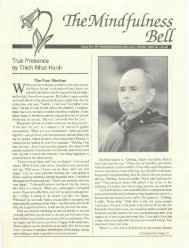Thay Giac Thanh June 9, 1947 - The Mindfulness Bell
Thay Giac Thanh June 9, 1947 - The Mindfulness Bell
Thay Giac Thanh June 9, 1947 - The Mindfulness Bell
Create successful ePaper yourself
Turn your PDF publications into a flip-book with our unique Google optimized e-Paper software.
and loving speech in the congress. In that committee different<br />
parties were represented and also the Prime Minister was included.<br />
Mr. Narayan is no longer the chair of the parliament because he<br />
has become the president of India.<br />
I think we may like to write our senators and representatives<br />
so that in the U.S. Congress they may try to practice deep listening<br />
and loving speech. I would like to vote for those who have<br />
the capacity to listen and to use loving speech. I would suggest<br />
that in the Senate and in the House of Representatives there should<br />
Hatred, anger and violence can only be<br />
neutralized and healed with one<br />
substance. That is compassion.<br />
be a committee on deep listening and loving speech. Not only<br />
should they listen to their own colleagues in the Congress but<br />
also they should listen to the suffering of people in their own<br />
country and to the suffering of people a little bit everywhere in<br />
the world. It is not easy to listen with compassion. <strong>The</strong> quality of<br />
deep listening is the fruit of practice. If we don't train ourselves it<br />
is very difficult to listen to the other person or people. We know<br />
there are many couples who can not listen to each other. <strong>The</strong>re<br />
are fathers who are incapable of communicating with their sons<br />
and daughters. <strong>The</strong>re are mothers who are not able to talk to their<br />
children, even if they want to very much. <strong>The</strong>y deeply wish that<br />
they could communicate with their daughter and their son or their<br />
partner but they can not do so. <strong>The</strong>y may be determined to use<br />
loving speech and compassionate listening. But without training<br />
they may give up after just a few minutes oflistening or trying to<br />
tell what is in their hearts. <strong>The</strong> blocks of pain and anger may be so<br />
big and important in their hearts that as they continue to listen,<br />
what they hear touches and waters the seeds of anger, of violence<br />
and of despair in them. <strong>The</strong>y are no longer capable of listening<br />
anymore, even if they have a lot of willingness to do so.<br />
For the person who is determined to speak with loving kindness,<br />
we know that goodwill is there. But as she or he continues<br />
to speak, the block of suffering, of despair, of irritation and of<br />
anger are touched in them. That is why very soon their speech<br />
will be full of judgment, blaming and irritation, and the other person<br />
cannot bear to listen. If we do not train in the art of compassionate<br />
listening and loving speech we cannot do it. But if we<br />
have a great determination, then five days may be enough to<br />
restore communication between the other person and ourselves.<br />
In the case of our Palestinian friends and our Israeli friends, two<br />
weeks was enough for them to understand and to accept each<br />
other as brothers and sisters. Two weeks was enough for them to<br />
have hope.<br />
<strong>The</strong> Secret of Listening<br />
<strong>The</strong> secret of success is that when you listen to the other<br />
person you have only one purpose. Your only purpose is to offer<br />
8 Winter 2001 • 2002<br />
him or her an opportunity to empty his or her heart. If you are able<br />
to keep that awareness and compassion alive in you, then you<br />
can sit for one hour and listen even if what the other person says<br />
contains a lot of wrong perceptions, condemnations and bitterness.<br />
You can continue to listen because you are already protected<br />
by the nectar of compassion in your heart. If you do not<br />
practice mindful breathing in order to keep that compassion alive<br />
you lose your capacity of listening. Irritation and anger will come<br />
up and the other person will see it and he or she will not be able to<br />
continue. We have the awareness that listening like this has only<br />
one purpose: allowing the other person a chance to empty his or<br />
her heart. If we are capable of keeping that awareness alive during<br />
the time of listening then we are safe, because compassion<br />
will always be there if that awareness is still there.<br />
We do not try to correct the wrong perceptions of the other<br />
person while listening. We just say, "I am sorry you have suffered<br />
so much." Later on, maybe in a few days or weeks, we will<br />
find an appropriate occasion to offer some information to help the<br />
other person or people correct their perceptions. But we do not<br />
try to correct all of their misperceptions at one time. Truth heals,<br />
but it should be released in small doses over time, like a medicine.<br />
If you force the other person to drink all the medicine at one time,<br />
he will die.<br />
I am sure that all of us here know that hatred, anger and<br />
violence can only be neutralized and healed with one substance.<br />
That is compassion. <strong>The</strong> antidote of violence and hatred is compassion.<br />
<strong>The</strong>re is no other medicine. Unfortunately, compassion<br />
is not available in supermarkets. You have to generate the nectar<br />
of compassion in your heart. <strong>The</strong> teaching of the Buddha gives<br />
us very concrete means in order to generate the energy of compassion.<br />
If understanding is there, compassion will be born, and<br />
understanding is the fruit oflooking deeply. Do we have the time<br />
to stop and look deeply into our situation, into the situation of the<br />
other person, into the situation of the other group of people? If<br />
we are too busy, if we are carried away every day by our projects,<br />
by our uncertainty, by our craving, how can we have the time to<br />
stop and to look deeply into the situation? How can we look into<br />
our own situation, the situation of our beloved one, the situation<br />
of our family, of our community, of our nation and of the other<br />
nations? Looking deeply we find out that not only do we suffer,<br />
but also the other person suffers deeply. Not only our group<br />
suffers but the other group also suffers deeply. If that kind of<br />
awareness is born we will know that punishing is not the answer.<br />
Our Basic Practice<br />
All violence is injustice. We should not inflict that injustice<br />
on us and on the other person, on the other group of people. <strong>The</strong><br />
one who wants to punish is inhabited by violence. <strong>The</strong> one who<br />
enjoys the suffering of the other person is inhabited by the energy<br />
of violence. We know that violence cannot be ended with<br />
violence. It is the Buddha who said that responding to hatred


